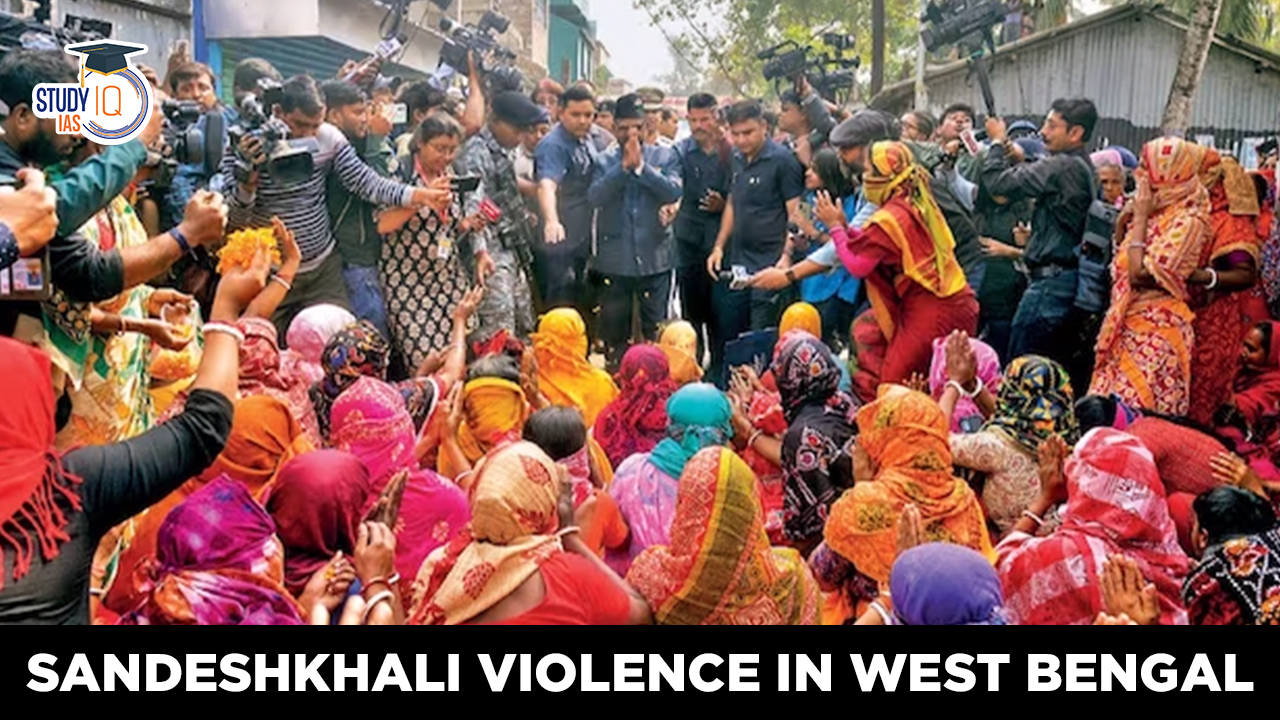Table of Contents
Sandeshkhali Violence
The Sandeshkhali violence in West Bengal has stirred widespread concern and calls for action in response to allegations of sexual assault, harassment, and other atrocities committed against women by members of the ruling Trinamool Congress (TMC). Situated in the North 24 Parganas district of West Bengal, Sandeshkhali has become a focal point of unrest and upheaval, prompting demands for accountability and justice.
Sandeshkhali Violence in West Bengal
The tranquil landscape of Sandeshkhali in West Bengal has been disrupted by a wave of violence and allegations of misconduct. Accusations of sexual assault, harassment, and intimidation have surfaced, implicating members of the ruling Trinamool Congress (TMC) and sparking outrage within the community. As the situation escalates, calls for accountability and justice reverberate amidst claims of police inaction and collusion.
At the center of the controversy lies Sheikh Shahjahan, an influential leader of the TMC, who stands accused of perpetrating atrocities against women in the area. Shahjahan’s alleged involvement in a ration allotment scam has attracted the attention of law enforcement agencies, with the Enforcement Directorate (ED) summoning him for questioning. However, Shahjahan remains elusive, evading authorities and exacerbating tensions within the community.
We’re now on WhatsApp. Click to Join
Attempts by ED officers to raid Shahjahan’s residence were met with violence, as his associates reportedly assaulted the officers, leaving several injured. This brazen act of defiance against law enforcement underscores the impunity enjoyed by individuals with political connections, further eroding trust in the justice system.
Criticism has also been leveled at local police authorities for their perceived inaction and complicity in the matter. Despite mounting evidence and public outcry, Shahjahan has not been apprehended, raising suspicions of collusion between the police and the ruling dispensation. Allegations of threats and harassment directed at victims and their families by law enforcement further underscore the breakdown of trust between the community and authorities.
In light of these developments, calls for an impartial and transparent investigation have grown louder. A petition filed before the Supreme Court seeks the intervention of a court-monitored probe, either by the Central Bureau of Investigation (CBI) or a Special Investigation Team (SIT), akin to previous instances of judicial oversight in similar cases. The urgency of the matter cannot be overstated, as victims remain fearful of reprisals and hesitant to come forward with their accounts of abuse.
The National Commission for Women’s inquiry into the matter has revealed disturbing findings, including instances where police filed complaints against the relatives of victims instead of addressing their grievances. Such actions not only impede the pursuit of justice but also perpetuate a culture of impunity, where perpetrators are shielded from accountability.
As the Supreme Court deliberates on the petition, hopes for justice and redress hang in the balance. The outcome of this case will not only shape the future of the Sandeshkhali community but also serve as a litmus test for the judiciary’s commitment to upholding the rule of law and protecting the rights of the marginalized. In a state grappling with political turmoil and social unrest, the resolution of the Sandeshkhali violence case holds profound implications for the broader struggle for justice and accountability.
Causes of Sandeshkhali Violence
- Political patronage fuels impunity, empowering individuals like Sheikh Shahjahan.
- Economic marginalization exacerbates grievances and fuels frustration.
- Gender-based violence and discrimination persist, especially against women.
- Police inaction and corruption undermine trust in law enforcement.
- Inter-community tensions and caste-based discrimination heighten conflicts.
- Lack of accountability and transparency fosters resentment among residents.
- Political polarization complicates efforts to address underlying issues.
- Systemic failures perpetuate conditions conducive to violence and instability. Efforts to promote justice, inclusivity, and accountability are crucial for fostering peace and stability in Sandeshkhali.
Violent Protest in Sandeshkhali Demanding Arrest
The protests underscore a deep-seated sense of injustice and disillusionment within the community, exacerbated by perceived indifference and inaction on the part of local authorities. Allegations of police complicity and collusion with powerful individuals like Shahjahan have further eroded public trust, fueling grievances and prompting calls for systemic reform.
As tensions continue to simmer, there are growing concerns about the potential for further escalation and violence. The need for a swift and impartial investigation into the allegations, coupled with concrete measures to address grievances and restore faith in the rule of law, has never been more pressing.
In response to the escalating crisis, civil society groups and human rights organizations have called for immediate action to de-escalate tensions and ensure the safety and well-being of all residents. The role of the judiciary, particularly the Supreme Court, has been pivotal, with petitions seeking court-monitored probes and intervention to uphold the principles of justice and accountability.
Way Forward
The turmoil and unrest in Sandeshkhali demand immediate and concerted action to address the grievances of the affected community and to restore faith in the rule of law. Here are some steps that could pave the way forward:
- Swift and Transparent Investigation: The allegations of sexual assault, harassment, and violence must be thoroughly investigated in a prompt and transparent manner. A court-monitored probe, as requested in the petition before the Supreme Court, could ensure impartiality and accountability in the investigation process.
- Arrest and Prosecution: Those accused of perpetrating atrocities, including Sheikh Shahjahan and his associates, must be apprehended and brought to justice swiftly. The law must apply equally to all individuals, regardless of their political affiliations or influence.
- Police Reform and Accountability: There is an urgent need for police reform to address allegations of complicity and collusion. Police officers found to be neglecting their duties or obstructing justice must be held accountable. Training programs focused on gender sensitivity and dealing with cases of sexual violence may also be implemented.
- Support for Victims: Efforts must be made to provide support and assistance to victims of sexual assault and harassment. This includes access to medical care, counseling services, legal aid, and protection from further harm or intimidation.
- Community Engagement and Reconciliation: Dialogue and engagement with the local community are essential to rebuilding trust and fostering reconciliation. Civil society organizations, human rights groups, and community leaders can play a crucial role in facilitating dialogue and promoting understanding among different stakeholders.
- Preventive Measures: To prevent future incidents of violence and injustice, long-term measures such as awareness campaigns on gender-based violence, strengthening of local grievance redressal mechanisms, and enhancing women’s safety and empowerment initiatives should be prioritized.
- Oversight and Monitoring: Continuous oversight and monitoring by independent bodies, including the National Commission for Women and human rights organizations, are essential to ensure that justice is served and that the rights of all individuals are protected.
- Government Accountability: Lastly, there must be accountability at all levels of government. Officials must be held responsible for their actions or inaction in addressing the crisis in Sandeshkhali. Transparent communication and regular updates on the progress of investigations and actions taken will help maintain public trust.


 GPS Spoofing and Its Impact in India: A ...
GPS Spoofing and Its Impact in India: A ...
 Amrit Gyaan Kosh Portal: A Comprehensive...
Amrit Gyaan Kosh Portal: A Comprehensive...
 UpLink Initiative: Launched by World Eco...
UpLink Initiative: Launched by World Eco...





















